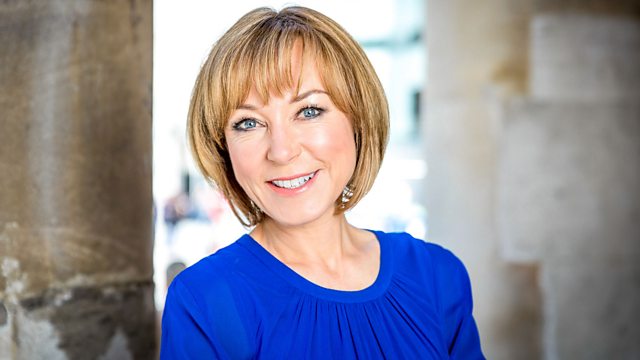
Episode 3
Sian Williams and guests discuss battling terrorism ten years on from the London bombings. Racing legend Jackie Stewart talks to Hardeep Singh Kohli on British Grand Prix weekend.
Are we too selfish to be donors?
In the past ten years, there has been a 40 per cent decline in new blood donors, and while stem cell transplants from adult donors are the last hope for patients with blood cancers, more than 400 patients die each year because they lack a suitable donor. But why are we so reluctant to donate? Have our busy lives eradicated our generosity towards those in need? Are we too selfish to be donors?
Mirabela al-Shaikh's son Omar lost his battle with leukaemia one week before the programme, when a donor could not be found in time. She speaks about the losing battle. 大象传媒 Journalist and acute myeloid leukaemia patient Sue Lloyd Roberts shares an exclusive update about her own quest for a stem cell donor.
Panel:
Journalist and researcher Myriam Francois-Cerrah
Former Anglican bishop of Rochester and former HFEA member Bishop Michael Nazir-Ali
Senior Rabbi to the Movement for Reform Judaism Rabbi Laura Janner-Klausner
Journalist and acute myeloid leukaemia patient Sue Lloyd Roberts
How should Britain combat extremism?
In the run-up to the commemorations of the tenth anniversary of the 7/7 bombings, prime minister David Cameron has called on Britain to be 'more intolerant of intolerance'. The week also saw the launch of new counter-extremism requirements for teachers in schools.
Teachers' unions have spoken out about confusion and nervousness in the classroom. Is this the right way to fight extremism? Or do strategies like Prevent further ostracise already marginalised minorities? Teacher Guzzy Khan shares his thoughts on counterterrorism in the classroom.
Panel:
Journalist and commentator Douglas Murray
Mavis Hyman, who lost her daughter Miriam in the 7/7 bombings, talks about the campaign to tackle extremism in schools
Hardeep Singh Koli talks religion and racing with Formula 1 legend Sir Jackie Stewart on the morning of the British Grand Prix.
Is future genocide inevitable?
It has been 20 years since the massacre in Srebrenica, and in the intervening years, the world has seen continued campaigns of violence inflicted on innocent civilians. But when it comes to genocide, what motivates neighbours to turn on each other? Has something evolved in the human psyche that gives rise to such atrocities? Is genocide inevitable?
Panel:
Evolutionary psychologist at Brunel University Dr Michael Price
Genocide studies expert Prof Donald Bloxham
To celebrate the 150th anniversary of the Salvation Army, a six-piece Salvation Army band play out the programme with a rousing rendition of Star Lake March.
Last on
More episodes
Previous
Next
For more information on different types of donation please go to:
Credits
| Role | Contributor |
|---|---|
| Presenter | Sian Williams |
| Interviewer | Hardeep Singh Kholi |
| Interviewed Guest | Jackie Stewart |
| Production Coordinator | Caoimhe Cassidy |
| Producer | Muireann McGinty |
| Assistant Producer | Sarah Carson |
| Editor | Kuljinder Khaila |
| Participant | Mirabela al-Shaikh |
| Participant | Myriam Francois-Cerrah |
| Participant | Michael Nazir-Ali |
| Participant | Laura Janner-Klausner |
| Participant | Sue Lloyd Roberts |
| Participant | Guzzy Khan |
| Participant | Douglas Murray |
| Participant | Mavis Hyman |
| Participant | Michael Price |
| Participant | Donald Bloxham |
Broadcast
- Sun 5 Jul 2015 10:00


